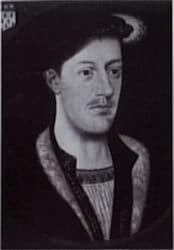
On this day in 1536, the five men condemned to death for high treason prepared for their executions, which were scheduled for the following day.
Sir William Kingston wrote to Thomas Cromwell on 16th May regarding preparations for the building of the scaffold for Anne Boleyn’s execution and mentioning that the men were waiting to make their last confessions to “Doctor Allryge”.1 We can assume that he turned up as Kingston was waiting for him to come.
Kingston also wrote of how he had seen the King that day regarding “the petitions of my Lord of Rochford”. George had fretted the whole time he’d been in the Tower. He wasn’t afraid of dying, but he was afraid that his debtors would not be paid and that those who owed him money would end up getting into trouble if they had to pay the King instead. So consumed with worry was George that Sir William Kingston wrote to Cromwell twice, firstly saying “The said Lord desires to speak with you on a matter which touches his conscience”2 and then reiterating it in a second letter: “You must help my lord of Rochford’s conscience”.3 One person George was concerned about was a monk who, with Cromwell’s help, George had got promoted. The monk had paid George £100 and owed a further £100, but the Abbey had now been ‘suppressed’. The monk had no way of paying George back and George was worried that the Crown would demand the payment. Kingston begged Cromwell to step in and help George. We do not know if Cromwell ever visited George, but Kingston managed to speak to the King.
As Clare Cherry4 points out, George had good reason to worry about those who owed him money. Fast forward to 1538 and George Brown, Archbishop of Dublin, writes to Thomas Cromwell asking to be released of his debt of £400 sterling, which he had owed Lord Rochford.5 Fortunately for Brown, his debt was discharged.
In preparation for his death, Sir Francis Weston wrote a letter of farewell to his parents to send with a list of his debts:
“Father and mother and wife, I shall humbly desire you, for the salvation of my soul, to discharge me of this bill, and for to forgive me of all the offences that I have done to you, and in especial to my wife, which I desire for the love of God to forgive me, and to pray for me: for I believe prayer will do me good. God’s blessing have my children and mine.
By me, a great offender to God.”6
I find it moving to read the words of a man so close to death for crimes which, I believe, he did not commit.
Here is the list of debts, taken from Letters and Papers, which Weston sent to his parents:
“Debts owing by Sir Francis Weston at the time of his death, “as more plainly appeareth by a bill of the particulars written with his own hand.”
Creditors:—My cousin Dyngley with my father, John Horseman, Barnarde my father’s cook, Mr. Harve, Farfax, John Rutter, Wyngfyld, Browne the draper, Domyngo, Genenes (Jennings?), the page of the chamber, Peter Hoseer, Hocrofte, my lord of Wiltshire, William Horant, Pope, Bradbe the broderer, Brydges my tailor, Parson Robynson, “a poor woman that Hannesley of the tennis play had married for balls I cannot tell how much,” Cornelius the goldsmith, Harde Derman at the gate, Henry Semer, Mr. Bryan, the King for 40l. and 50 mks., Mr. Locke, Henry Parcar, page, Thomas Dyer, Sir William Peccarynge, William the broderer for 35l., “whereon he has a gown, a coat, and a doublet of cloth of gold,” my sadler, George Node, my shoemaker, Ambrose Barcar, Codale at Greenwich, Crester my barber, Richard Gresscham, Percake of the stable, Chr. Melyner, Askewe in Watlyngstrete, my lady Mosgrave 50l. whereon she has plate of mine, Jocelyne that was Mr. Norreys servant, John Norres, Secheper that playeth at the dice, Temple the fletcher, the King’s broderer. Total, 925l. 7s. 2d.”7
Notes and Sources
- LP x. 890
- Ibid.
- Ibid., 902
- Clare Cherry, unpublished manuscript on George Boleyn
- The letter can be read in State Papers: King Henry the Eighth; Part III. Continued, p11
- LP x. 869
- Ibid.